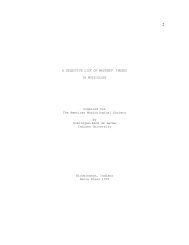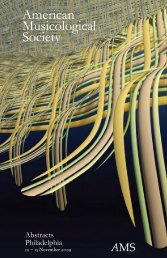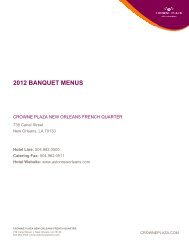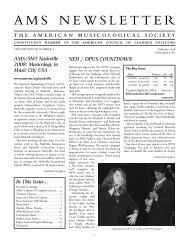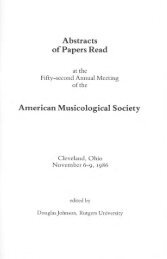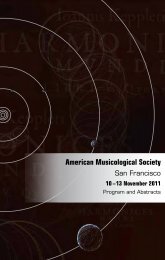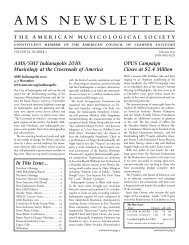Abstracts - American Musicological Society
Abstracts - American Musicological Society
Abstracts - American Musicological Society
You also want an ePaper? Increase the reach of your titles
YUMPU automatically turns print PDFs into web optimized ePapers that Google loves.
4 Thursday Morning: Session 1- 4<br />
AMS/SEM/SMT New Orleans 2012<br />
potential publics are imagined and represented in the rehearsals of an amateur ensemble for Turkish Art Music in Berlin,<br />
Germany. Drawing on participant observation at rehearsals and concerts, as well as interviews with ensemble members, I will<br />
argue that the activity of rehearsing enables participants in this ensemble to imagine themselves as members of multiple publics,<br />
as well as to situate the ensemble itself as a form of public-making. I will argue that this process of public-making through<br />
rehearsing is crucial to understanding the political context of musical practice for Turkish Germans in Berlin, where the<br />
formation of publics is deeply intertwined with local constructions of ethnic, religious, and musical difference. By imagining<br />
multiple forms of local, national, and diasporic publics through the practices of rehearsing, performers of Turkish Art Music in<br />
Berlin can craft varied interventions in struggles over the representation of identity and citizenship in contemporary Germany.<br />
Rehearsing the Social: Becoming a Performer in Kampala’s Classical Music Scene<br />
Suzanne Wint (University of Chicago)<br />
Methodologically, rehearsals are some of the most fruitful spaces for ethnomusicological research; yet monographs prioritize<br />
the performance or ritual over the rehearsal, despite the critique that studies of the everyday (de Certeau, De Nora, Berger<br />
and Del Negro) have levied upon ritual studies. In practices in which improving a sound product for public consumption is<br />
a goal, the rehearsal is often overshadowed. In this paper, I shift the focus to the rehearsal as an important space of socialization,<br />
both in terms of learning to be part of a performance tradition, and attending to social bonds important to the local<br />
performance scene. By examining the case of Western art music performance in Kampala (Uganda), I show how practitioners<br />
use the space of the rehearsal to rehearse the etiquette of classical performance, the presentation of oneself within boundaries<br />
of appropriate behavior for the performing group, and the cultivation of relationships of reciprocal obligation so important<br />
within society beyond the rehearsal. Specifically, I consider a number of ethnographic moments in rehearsals with Christ the<br />
King 10 O’Clock Choir that highlighted what the group considered proper interaction between conductor and choir, choir<br />
and audience, between members, and between musicians of different performing groups.<br />
Recording Rehearsing: The Hidden “Process of the Classical Studio Session”<br />
Gregory Weinstein (University of Chicago)<br />
Western classical music recordings provide a complete and continuous interpretation of a musical work. However, the<br />
record’s apparent linearity obscures the complex musical processes and collaborations involved in producing that rendition.<br />
These processes include fixing mundane technical details, as well as instances of musicians and recordists collaborating to<br />
work out musical ideas and interpretations. Moreover, the technological features of the recording studio allow musical collaborators<br />
to refine or alter their interpretations. Musicians have the opportunity to listen back to a recording and adjust<br />
their performance accordingly; they can discuss the musical work and benefit from the feedback of colleagues; and recordists<br />
have the ability to edit a convincing and “continuous” interpretation during post-production. This paper will consider these<br />
“hidden” elements of classical record production as a part of a multi-linear rehearsal process through which a musical work is<br />
brought into linear existence on record. I will draw on my experiences at a variety of classical recording sessions in the United<br />
Kingdom in order to demonstrate how a musician’s concept of a work can change dramatically during the course of a recording<br />
session, and how such shifts in interpretation are usually uniquely mediated by the studio environment. By considering<br />
the recording process as a rehearsal where musicians and recordists can experiment musically and technologically, we can shed<br />
new light on conventional notions of the musical work and the nature of musical collaboration.<br />
Session 1-4 (SEM), 8:30–10:30<br />
Cultural Authority and Music: Historical Questions from the Middle East and Central Asia<br />
Ann E. Lucas (Brandeis University), Chair<br />
Music and Authority: The Changing Function of Music Under the Safavid Dynasty, 1501–1722<br />
Ann E. Lucas (Brandeis University)<br />
In the literature on Persian music, the Safavid Dynasty is often depicted as overseeing a period of drastic musical decline<br />
(for instance, Mashun 2003, Zonis 1973). Yet there is no actual evidence that either musical performances or consumption of<br />
music were curtailed under the Safavids. In fact, the Safavids memorialized their own music patronage in many visible ways,<br />
including a codex of musical writings compiled by imperial decree towards the end of their reign. In this paper, I will look at<br />
the changing place of music in the Safavid Empire. I analyze both song texts collections and music treatises from the Safavid<br />
codex, as well as musical writings from their dynastic predecessors, the Timurids, in order to demonstrate that music took<br />
on new significance within the Safavid’s gunpowder empire, rather than simply declining. As divine monarchs, the Safavids<br />
sought to project a new kind of divine greatness at every opportunity. Thus, more music set out to convey the omnipotence of



